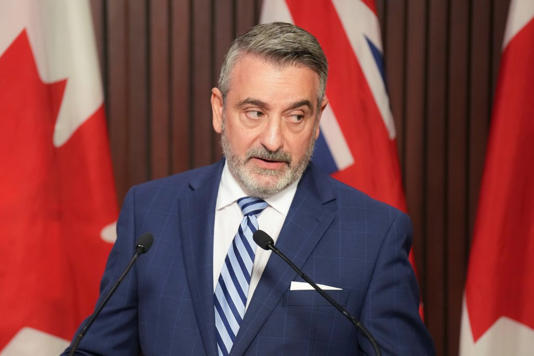
Premier Doug Ford is poised to break a deathbed promise to Hazel McCallion that would dissolve the Region of Peel in 2025 and create an independent City of Mississauga – part of a suite of reversals announced by the province on Wednesday.
The Ford government passed the Hazel McCallion Act in early June as a tribute to the longtime former mayor and her decades-long effort to separate Mississauga from its regional cousins: Brampton and Caledon.
In an about-face, Housing Minister Paul Calandra said his government “originally thought that the best way to achieve our (housing) goals” was by dissolving the Region of Peel, but quickly realized the escalating costs – as presented by Brampton – would pose both a financial and political problem for the Progressive Conservatives.
“We’ve since heard loud and clear from municipal leaders and stakeholders that full dissolution would lead to significant tax hikes and disruption to critical services the people of Peel Region depend on,” Calandra said, without providing firm numbers to back up the concern.
Brampton Mayor Patrick Brown asserted that the split would have left his city with a $1.3-billion budget shortfall, forcing him to raise municipal property taxes ahead of the 2026 provincial election.
Mississauga, however, countered that Brampton’s figures were based on faulty assumptions and pressed the premier to uphold his promise to McCallion.
Sensing political turmoil in the 905 — a key region to forming a majority government — the Ford government sided with Brampton’s calculations and suggested the tax increase concerns directly contributed to the decision.
“While some might be OK with raising taxes on hard-working people, families and businesses, we aren’t,” Calandra said.
Speaking to reporters after the reversal was announced, Calandra did not say which numbers or reports he had relied upon to make the decision to keep Peel Region together.
“We’ve heard the numbers from Brampton, we’ve heard a lot of delegation also coming from Caledon,” he said. “I’ve heard from Peel Region, I’ve heard from Peel police, I’ve heard from Peel paramedics.”
The province said it will be tabling legislation in the new year to repeal the Hazel McCallion Act and revoke plans to fulfill her lifelong ambition of making Mississauga an independent city from the Region of Peel.
Ontario NDP Leader Marit Stiles welcomed the reversal, calling the flipflop a “seriously concerning” pattern for the Ford government.
“Thank goodness they’re reversing these terrible plans, but the question everyone should be asking themselves is: why did they make them in the first place? ” Stiles said, accusing the government of “policy on the back of a napkin.”
The announcement came the same day Mississauga Mayor and newly minted Ontario Liberal Leader Bonnie Crombie announced the date she would resign as Mississauga mayor.
Calandra said the reversal and its timing were not related to Crombie.
“What I’m announcing today is work that I have been under a lot of consultation with other municipal leaders (on), with AMO, it is part of the recommendation that are coming from the Peel transition panel,” he said.
Crombie said she didn’t see the announcement as an end to Mississauga’s fight for independence, suggesting the province was doing its “homework” on the split.
Calandra, however, said councillors would sit at the Region of Peel after the 2026 municipal elections and beyond.
More on Politics
Crombie said the province should stop “caving to pressure” and “rushing” to make decisions based on “fearmongering.”
Mississauga’s CAO Shari Lichterman said she did not believe any financial projects had been submitted to the province by the transition board.
Brown said he was pleased the province did “the right thing” by calling for dissolution.
Video: Brown accuses Crombie of being ‘absent,’ not making case to Peel transition board
He said the financial analysis he had put forward was “irrefutable” evidence the split of Peel Region would cost taxpayers.
Calandra claimed he was “actually quite excited” about opportunities from the reversal.
He hailed “the opportunity for us to eliminate red tape and duplication because of the work that has been done by the Peel Transition Board”
The government said it would refocus the five-person transition board it appointed to handle the split of the region. The transition board was brought together to decide how municipal services run by the region should be divided when it dissolved; it will now be ordered to make the existing region “more efficient.”
It will specifically be told to work out how to make the region more efficient at building homes and land-use planning.
Crombie called the review of the few select areas a “first step” in the split of Peel Region.
The transition board, which was only announced in July, has been working with Brampton, Caledon and Mississauga to plan for dissolution. It had planned 70 meetings between November and March to decide how services should be split but had not yet hired its own staff.
At the same time, Calandra announced he would be revoking a handful of minister’s zoning orders handed out by his predecessor and cancelling audits it had initiated to find out if its new housing rules would lead to property tax hikes.
Source: Global News
